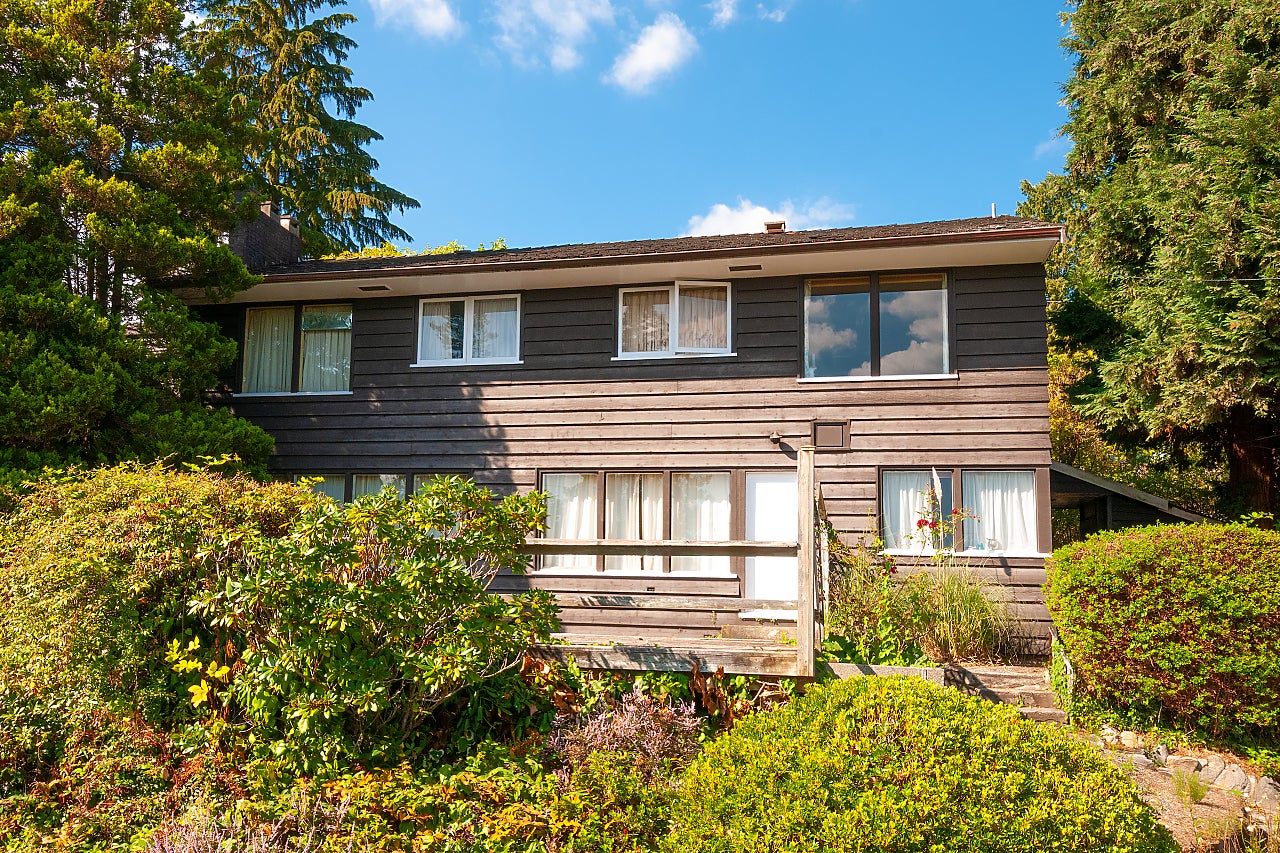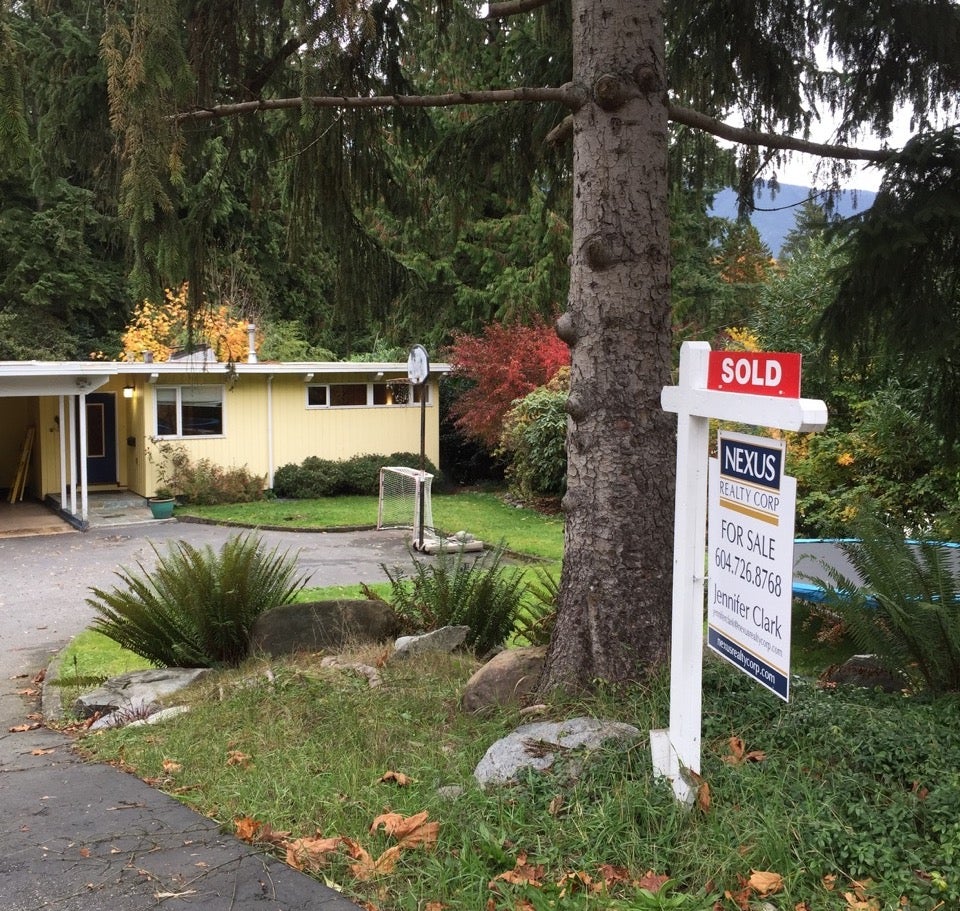IN THIS ISSUE:
• 2020s: people of all ages in the same community
• Character Homes on ‘Affordability Street’
• Impressive October stats for Greater Vancouver
• Maclean’s: property still good investment?

The 2020s: almost here, what’s in store?
First in a series
The matriarch of our family is 103. Her name is Anne and she lives in a small town in Saskatchewan. While “home” is a seniors residence, she still has the house where her children were raised, and she goes back every time one of us visits her. The house is in the heart of her town, right by  the post office. On visits to the family home, Anne sees all kinds of people. She sees life. She gets perspective.
the post office. On visits to the family home, Anne sees all kinds of people. She sees life. She gets perspective.
 the post office. On visits to the family home, Anne sees all kinds of people. She sees life. She gets perspective.
the post office. On visits to the family home, Anne sees all kinds of people. She sees life. She gets perspective.
What does this have to do with real estate?
Anything that changes the way we live impacts real estate. How will we live in the 2020s? What’s real estate going to look like?
This new decade is upon us…
One of the indicators is that life, and real estate’s part in it, will be different for seniors in the 2020s. Rather than residing away from where they may be more integrated with young people, the seniors of 2020 may see a change in daily life as they know it. The general idea is having people of all ages, living in all parts of a community.
If it happens, and the proportion of seniors is growing in developed countries, it’s going to impact “where we live.” Cities will find how to do housing effectively for a growing demographic that benefits from remaining engaged, maintaining relationships and being socially and mentally active. It’s not a stretch to stay that one benefit is helping to reduce the strain on public health services.
This process is already underway in some countries. In Great Britain, an experiment that brought pre-schoolers into a retirement community resulted in improved physical and mental health among the seniors. Community-based senior living has been operational for years in Sweden and The Netherlands, where students live in a long-term care facility, free, in exchange for spending time with elderly residents.
Having students around can keep seniors feeling and acting less senior, by being included in a community that is vibrant and interactive for people of all ages.
In a nutshell: more stimulation, less isolation.
We have seen the impact of that first-hand in our Anne, the Saskatchewan centenarian.
If it happens, and the proportion of seniors is growing in developed countries, it’s going to impact “where we live.” Cities will find how to do housing effectively for a growing demographic that benefits from remaining engaged, maintaining relationships and being socially and mentally active. It’s not a stretch to stay that one benefit is helping to reduce the strain on public health services.
This process is already underway in some countries. In Great Britain, an experiment that brought pre-schoolers into a retirement community resulted in improved physical and mental health among the seniors. Community-based senior living has been operational for years in Sweden and The Netherlands, where students live in a long-term care facility, free, in exchange for spending time with elderly residents.
Having students around can keep seniors feeling and acting less senior, by being included in a community that is vibrant and interactive for people of all ages.
In a nutshell: more stimulation, less isolation.
We have seen the impact of that first-hand in our Anne, the Saskatchewan centenarian.
Next month: Eco Effect in the 2020s

Affordability: Huge role for Character Homes
Generations of a family have long co-habitated, but “affordability” is taking that to a new level, at least in Greater Vancouver.
And “co-habitating” is often more living on the same property than living down the hall.
Multi-generational households, which have long been practical in Europe and Asia, are growing here. Practicality rules. Free-standing homes on lots with detached houses are increasing.
On lots with Character Homes in the City of Vancouver, they are called Coach Houses (on other lots, they're sometimes referred to as Laneway Homes). The presence of Character Homes is significant enough that on the Nexus website, there’s an entire section devoted to helping you locate and assess the attraction of Vancouver’s Character Homes.
Researching Character Homes is dictated by the need for more affordable housing. When a family’s grown children find home ownership daunting or impossible in the city where they grew up, Coach Houses provide a possible solution, when applicable and when desirable. For example, when the property is big enough to accommodate another free-standing house, it can provide modest space and privacy for probably less than half the price of the same-sized house on a single lot in the same neighbourhood.
Character Homes take it all to a different level.
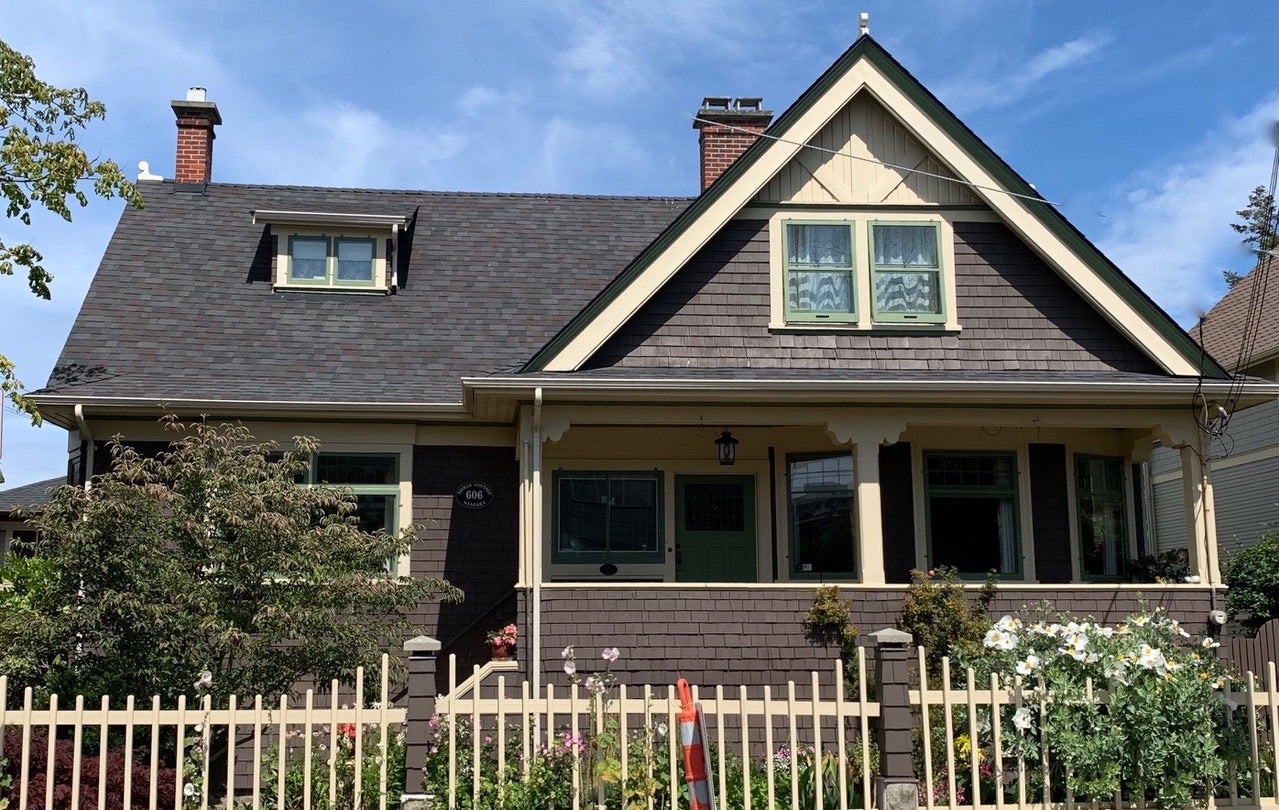 On the right type of lot, it’s possible to accommodate three generations (or more), which means three families (or more), by not just building a Coach House but also adding onto the Character Home itself and having all three become homeowners.
On the right type of lot, it’s possible to accommodate three generations (or more), which means three families (or more), by not just building a Coach House but also adding onto the Character Home itself and having all three become homeowners.
What’s a Character Home?
It’s a home built prior to 1940, in the City of Vancouver. That’s where you start, and that’s easy because our Character Homes page it's set up so that you can find them in every price range just by clicking on one of the links. The inventory of Character Homes isn’t infinite, of course, but they’re a novel way to help deal with the affordability crisis…and to keep family units together.
Is there an appetite for that?
According to a recent Vancouver Sun article, multi-generational households are the fastest-growing housing category in Canada, with a 37% increase in households with three generations from 2001 to 2016. And one building design firm said more than 90 per cent of its clients want to accommodate “three-plus generations.”
With extensive and thorough research done, Nexus Realty has become a specialist in the Character Homes market. It is the first — and hopefully best — place to start.
Watch upcoming editions of News From Nexus to learn more about how Character Homes become wise choices.

What our clients are saying...
“They took all the precautions, which was important. They were very exacting about everything. They are such a great combination. Jennifer was so very particular with signing documents, and keeping everyone completely up to date on everything!”
— Ron and Ethel Youngberg, North Vancouver
— Ron and Ethel Youngberg, North Vancouver


That last month a parking spot in Hong Kong sold for $1.3 million (CDN), located in the priciest office tower in the world (The Center in Central) — about the same price as a 2-bedroom penthouse apartment currently listed in downtown Vancouver?
Real estate as an investment opportunity
The current edition of Maclean's Magazine includes an article titled: "Is real estate still a good investment for Canadians?"
Naturally, the article is designed for national interest but it provides some guidelines or concepts that should at least be considered whether you live in Smalltown Canada or in a major metropolitan area like Vancouver.
Of particular interest for investors is that investing in stocks, equities or gold usually requires 100 per cent of the cost up front, investing in real estate can be accomplished for 20 per cent of the purchase price, a fact that can easily be overlooked.
The entire article can be found here.
Nexus Note: We always encourage clients to see real estate investing as more than a short-term deal, and to plan on a five-year time horizon. Our approach is that if they can do a financial plan that they're okay with for five years, it will probably do okay as an investment.
Of particular interest for investors is that investing in stocks, equities or gold usually requires 100 per cent of the cost up front, investing in real estate can be accomplished for 20 per cent of the purchase price, a fact that can easily be overlooked.
The entire article can be found here.
Nexus Note: We always encourage clients to see real estate investing as more than a short-term deal, and to plan on a five-year time horizon. Our approach is that if they can do a financial plan that they're okay with for five years, it will probably do okay as an investment.

Has the worm turned for Vancouver real estate?
When the year-end real estate analysts reflect on 2019, it’s possible that October will jump out as the month that changed the game, the month more than any other when the market shifted into rebound mode.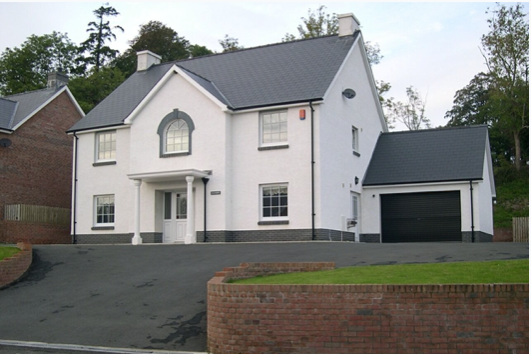 While it is only one month, the indicators point to a recovery, according to the latest statistics released by the Real Estate Board of Greater Vancouver.
While it is only one month, the indicators point to a recovery, according to the latest statistics released by the Real Estate Board of Greater Vancouver. For example, compared to October 2018, sales were up for:
• Overall homes, by 45.4 per cent
• Detached homes, by 40.5 per cent
• Attached homes, by 55.8 per cent
• Apartments, by 40.5 per cent
And compared to the previous month (September 2019), sales were up:
• Overall homes, by 22.5 per cent
• Detached homes, by 26.6 per cent
• Attached homes, by 27 per cent
• Apartments, by 18.7 per cent
Plus, the sales-to-active-listings ratio for October was 23.4 per cent — 17.3 per cent for detached homes, 26.2 per cent for attached homes and 29 per cent for apartments. Analysts say upward pressure on home prices occurs when that number exceeds 20 per cent…but for more than one month.
And here’s one more positive statistic: October sales were 9.8 per cent higher than the 10-year average for Octobers.
What’s most astounding about all this is not so much that sales are up, but that the percentages by which they are up — across the board — are so high. That might lead to wild speculation that the market is hot again. A more measured approach would be that it’s a good sign the market is warming up for the first time in many months.
Stay tuned.
• Overall homes, by 45.4 per cent
• Detached homes, by 40.5 per cent
• Attached homes, by 55.8 per cent
• Apartments, by 40.5 per cent
And compared to the previous month (September 2019), sales were up:
• Overall homes, by 22.5 per cent
• Detached homes, by 26.6 per cent
• Attached homes, by 27 per cent
• Apartments, by 18.7 per cent
Plus, the sales-to-active-listings ratio for October was 23.4 per cent — 17.3 per cent for detached homes, 26.2 per cent for attached homes and 29 per cent for apartments. Analysts say upward pressure on home prices occurs when that number exceeds 20 per cent…but for more than one month.
And here’s one more positive statistic: October sales were 9.8 per cent higher than the 10-year average for Octobers.
What’s most astounding about all this is not so much that sales are up, but that the percentages by which they are up — across the board — are so high. That might lead to wild speculation that the market is hot again. A more measured approach would be that it’s a good sign the market is warming up for the first time in many months.
Stay tuned.

Real Estate Monthly Statistics
The following statistics for West Vancouver, North Vancouver, Vancouver West and Vancouver East compare October 2019 to October 2018 (note: sales refers to number of sales, not to sale prices).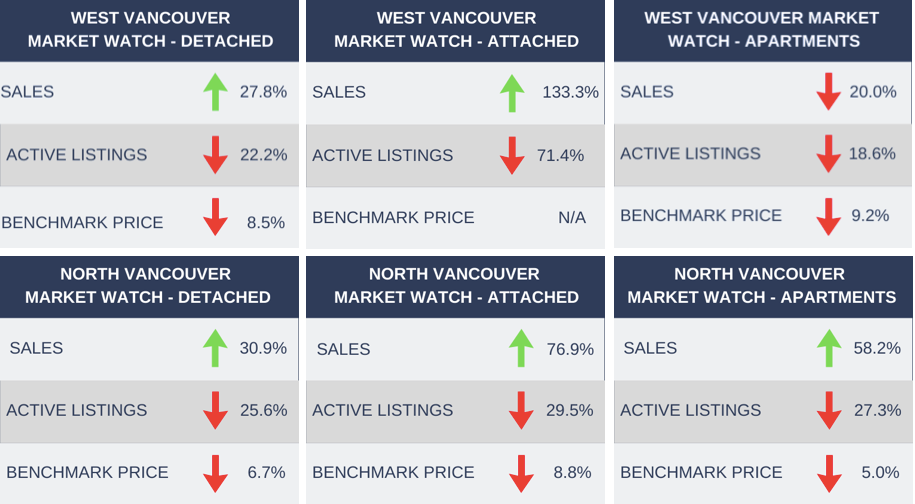
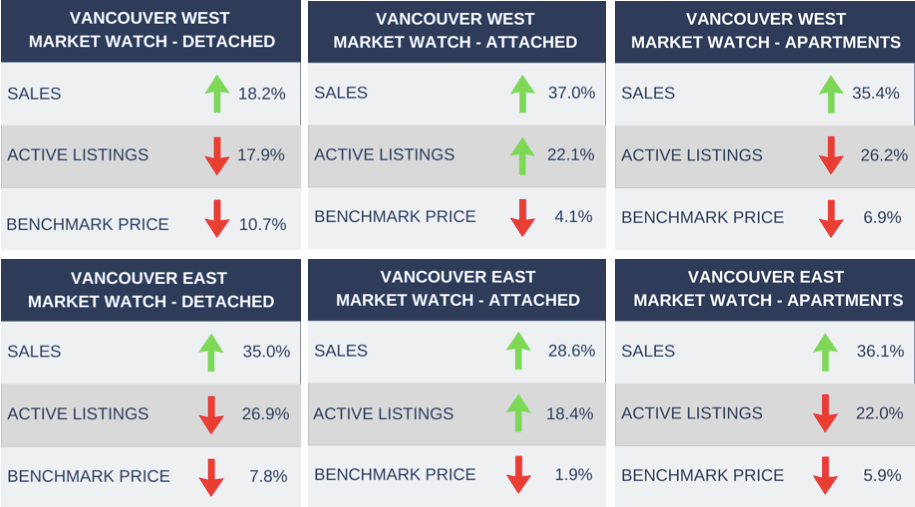
Benchmark Price: Estimated sale price of a benchmark property. Benchmarks represent a typical property within each market.

|
|
